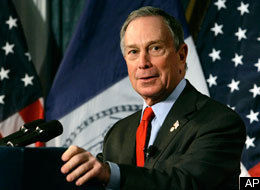Wall Street’s Candidate for the White House: Michael Bloomberg Indicates He Wants Clinton as President

On March 7th, Michael Bloomberg, NYC’s richest person and former Mayor, announced that he would not run for President and that he hopes Hillary Clinton will become the next President but that her recent rhetoric copying that of the anti-Wall-Street Senator Bernie Sanders is causing him some concern: “The leading Democratic candidates have attacked policies that spurred growth and opportunity under President Bill Clinton — support for trade, charter schools, deficit reduction and the financial sector. Meanwhile, the leading Republican candidates have attacked policies that spurred growth and opportunity under President Ronald Reagan.”
Bloomerg became NYC’s richest person by serving the Wall Street banks, “the financial sector.” He ignores the smaller financial institutions, which don’t bring income to his business, but he says (though only by implication, not by direct assertion) that Hillary Clinton’s rhetorical turn to the left is in violation of her husband’s time in office, when Bill Clinton deregulated Wall Street and so prepared the way for George W. Bush’s economic crash — which Bloomberg has always said wasn’t Wall Street’s fault.
Yet, despite that rhetorical left turn by Hillary, he still wants her to become President, because his polling shows that if he were to run, then none of the three candidates — Clinton, the Republican, and Bloomberg — would win more than 50%, and the choice of our President would be decided by the members of the U.S. Congress. And, “with Republicans in charge of both Houses, there is a good chance that my candidacy could lead to the election of Donald Trump or Senator Ted Cruz. That is not a risk I can take in good conscience.”
He doesn’t say that the election of Hillary Clinton “is not a risk I can take in good conscience,” but just that his being a candidate would deprive Hillary Clinton of the Presidency, and that that’s “not a risk I can take in good conscience.” So: he clearly prefers Clinton, despite his saying that, “The leading Democratic candidates have attacked policies that spurred growth and opportunity under President Bill Clinton.” He seems to be implying that Hillary Clinton’s recent rhetorical turn to the left is only in order to win the Democratic nomination — not a real indication of the way she would govern as President.
Beside his evident contempt for the Republican candidates, he is clear that he also would very much fear a Sanders Presidency, because no one questions the sincerity of Sanders’s intentions, which Bloomberg sees as rejecting “support for trade, charter schools, deficit reduction and the financial sector.”
Bloomberg’s statement makes clear his great admiration for Bill Clinton and Ronald Reagan — two very pro-Wall-Street Presidents, supporters of “the financial sector” that he obviously cares about very much.
He says: “The fact is, even if I were to receive the most popular votes and the most electoral votes, victory would be highly unlikely, because most members of Congress would vote for their party’s nominee. Party loyalists in Congress — not the American people or the Electoral College — would determine the next president,” which would be the Republican nominee, because Republicans have majorities in both houses.
This reading of his statement was also put forth in different ways by two articles in Politico on the same day as Bloomberg’s announcement. Karen van Hall wrote that “he was motivated to consider an independent bid not only because of Trump and Cruz but also because of Bernie Sanders, a self-described democratic socialist who has pledged to break up Wall Street banks — a direct threat to his financial data and media empire.” According to her analysis, the only candidate that Bloomberg doesn’t fear is Hillary Clinton — and he seems to feel rather confident that she will win her Party’s nomination and will then return to her Bill-Clintonite policies: pro-Wall-Street. Edward-Isaac Dovere wrote:
“In a Trump versus Sanders head-to-head, they figured, Bloomberg would ride the centrist lane right up to the White House, getting him elected outright in November.”
That clearly states Bloomberg’s having turned the more against running when Sanders’s crushing 74% loss to Clinton in South Carolina indicated, to Bloomberg, that Sanders wouldn’t be the Democrtic nominee — Clinton would. According to this line of thinking, Bloomberg might have entered the contest if Sanders were to be the nominee, but he no longer thinks that that possibility is credible enough for Bloomberg to enter the contest early enough to be able to get onto all the states’ ballots. He’s got to decide right now, and so he did. Perhaps he will be donating to Clinton’s campaign now.

